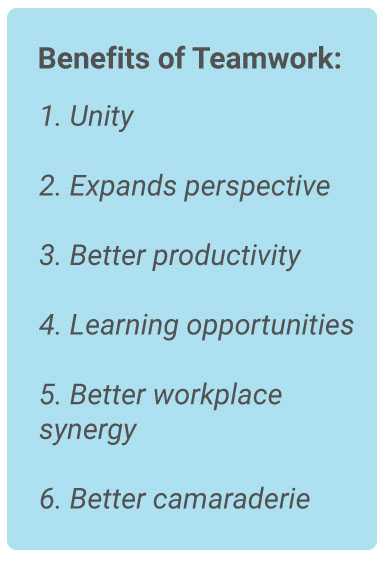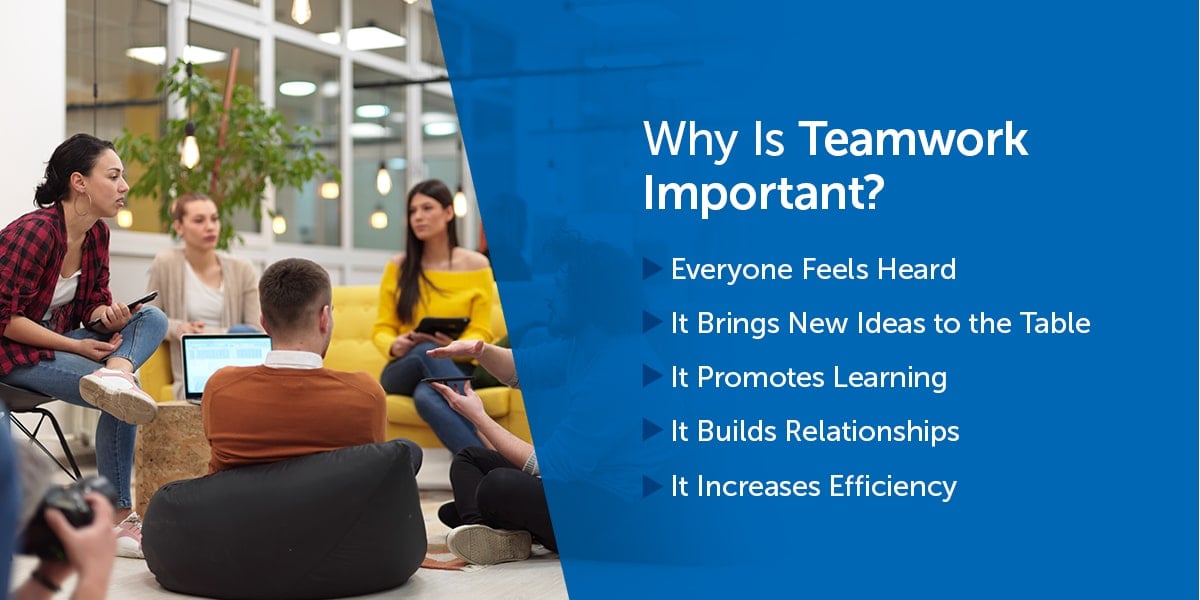In today’s fast-paced and competitive work environment, teamwork has become a crucial element for success. So, why is teamwork important in the workplace? Well, let me tell you! Teamwork is like the secret ingredient that makes a dish extra delicious. It brings together a diverse group of individuals, each with their own unique skills and perspectives, to collaborate towards a common goal.
Picture this: a symphony orchestra with no conductor, each musician playing their own tune. It would be chaos! Similarly, in the workplace, without teamwork, projects can quickly unravel, deadlines can be missed, and morale can plummet. But when teams come together, magic happens. They can pool their strengths, brainstorm innovative ideas, divide tasks efficiently, and support each other through challenges. Teamwork fosters synergy, where the whole becomes greater than the sum of its parts, propelling organizations towards success.
So, whether you’re working on a small project or tackling a massive endeavor, teamwork is the fuel that keeps the engine running smoothly. It promotes efficient communication, boosts creativity, and enhances problem-solving abilities. In a world where collaboration is key, embracing teamwork is not just important; it’s essential for organizations to thrive in today’s competitive landscape. So, let’s dive deeper into the myriad benefits of teamwork in the workplace and uncover how it can elevate both individuals and organizations to new heights.

Why Is Teamwork Important in the Workplace?
Teamwork plays a crucial role in the success of any organization. It involves individuals coming together, collaborating, and working towards a common goal. In today’s fast-paced and competitive business environment, teamwork has become more important than ever. It not only enhances productivity and efficiency but also fosters a positive work culture and promotes employee engagement. Let’s explore why teamwork is essential in the workplace and how it can benefit both employees and organizations.
Improved Problem-Solving and Decision-Making
When employees work together as a team, they bring diverse perspectives, experiences, and skills to the table. This diversity allows for a wider range of ideas and solutions when faced with challenges or decision-making. Different team members can contribute their unique insights, analyze problems from various angles, and collectively find the best solutions. This collaborative approach often leads to more innovative and effective problem-solving.
Moreover, teamwork reduces the burden on individuals and distributes the workload, allowing for a more efficient problem-solving process. It enables employees to brainstorm ideas, share knowledge, and learn from one another, ultimately enhancing the quality of decisions made. By leveraging the collective intelligence of the team, organizations can overcome obstacles more effectively and make well-informed decisions that drive success.
Increased Productivity and Efficiency
One of the key benefits of teamwork in the workplace is increased productivity and efficiency. When employees work together towards a common goal, they can accomplish tasks more quickly and effectively. By dividing the workload among team members based on their strengths and expertise, organizations can optimize the utilization of resources and ensure that each individual is working on tasks they are best suited for.
Teamwork also promotes accountability. When individuals work as part of a team, they feel a sense of responsibility towards their teammates and the shared objectives. This encourages them to stay focused, meet deadlines, and deliver high-quality work. Additionally, team members can provide support, guidance, and feedback to one another, fostering a culture of continuous improvement and increasing overall productivity.
A study conducted by the Harvard Business Review found that teams who collaborate well are 5 times more productive than those who don’t. This highlights the significant impact that effective teamwork can have on an organization’s performance and bottom line.
Enhanced Communication and Collaboration
Effective communication is the foundation of successful teamwork. When team members communicate openly and transparently, they can share information, clarify expectations, and align their efforts. This leads to better coordination, reduced misunderstandings, and improved collaboration.
Teamwork encourages employees to actively listen to one another, respect different viewpoints, and express their ideas and concerns freely. It creates an environment where individuals feel comfortable and empowered to contribute their thoughts, fostering a culture of open communication and trust. This not only strengthens relationships within the team but also enables more efficient collaboration and problem-solving.
Collaboration is especially crucial in today’s globalized and interconnected business landscape. With teams often spread across different locations and time zones, effective collaboration tools and strategies are essential to ensure seamless communication and coordination. By leveraging technology and fostering a collaborative mindset, organizations can overcome geographical barriers and harness the power of teamwork to achieve their goals.
Increased Employee Engagement and Job Satisfaction
When employees feel like valued members of a team, their level of engagement and job satisfaction increases. Teamwork provides individuals with a sense of belonging and purpose, making them more invested in their work and the success of the organization. It creates a supportive and inclusive work environment where employees feel motivated to give their best efforts.
Teamwork also promotes learning and personal development. As team members collaborate and share knowledge, they can expand their skills, acquire new perspectives, and grow both personally and professionally. This continuous learning and growth contribute to higher job satisfaction and employee retention.
Moreover, effective teamwork enhances employee morale. When individuals work together towards a common goal and witness the positive outcomes of their collective efforts, it boosts their motivation and satisfaction. Recognizing and celebrating team achievements further reinforces this positive work culture and fosters a sense of camaraderie among team members.
In conclusion, teamwork is vital in the modern workplace for several reasons. It improves problem-solving and decision-making, increases productivity and efficiency, enhances communication and collaboration, and boosts employee engagement and job satisfaction. By fostering a culture of teamwork, organizations can create a supportive and productive work environment, driving success and achieving their goals. So, embrace the power of teamwork and unlock the full potential of your organization.
Key Takeaways: Why is Teamwork Important in the Workplace?
- Teamwork promotes better communication and collaboration among employees.
- Working together as a team helps to achieve goals more efficiently.
- Teamwork enhances creativity and problem-solving skills.
- It creates a positive work environment and boosts employee morale.
- Teamwork fosters a sense of belonging and promotes a sense of unity among employees.
Frequently Asked Questions
1. How does teamwork contribute to a productive workplace?
Teamwork is essential for creating a productive workplace environment. When employees work together as a team, they can combine their skills and knowledge to solve problems and achieve common goals more efficiently. By sharing responsibilities and supporting one another, teamwork fosters a sense of unity and collaboration among employees. This helps in enhancing productivity as tasks can be completed faster and with better quality.
Furthermore, teamwork allows for the pooling of diverse perspectives and ideas. Different team members bring unique experiences and expertise to the table, which leads to more innovative and creative solutions. By leveraging the strengths of each team member, organizations can tap into the full potential of their workforce and achieve better outcomes.
2. How does teamwork improve communication in the workplace?
Teamwork plays a vital role in improving communication within a workplace. When employees work together as a team, they need to communicate effectively to coordinate their efforts and achieve common goals. This necessitates clear and open lines of communication, where team members can share information, ideas, and feedback.
In a collaborative environment, individuals are encouraged to actively listen and understand each other’s perspectives. This promotes better understanding and minimizes misunderstandings or conflicts that can arise from miscommunication. Teamwork also encourages an open and transparent culture, where employees feel comfortable expressing their thoughts and concerns, leading to more effective and efficient communication throughout the organization.
3. How does teamwork contribute to employee satisfaction and motivation?
Teamwork plays a significant role in fostering employee satisfaction and motivation in the workplace. When employees work together as a team, they feel a sense of belonging and camaraderie, which enhances their overall job satisfaction. Collaboration and support from team members create a positive work environment where employees feel valued and appreciated.
Moreover, teamwork provides opportunities for personal growth and development. Employees can learn from each other, acquire new skills, and expand their knowledge. This continuous learning and growth contribute to increased job satisfaction and motivation. Additionally, when employees see the impact of their collective efforts, it boosts their morale and motivates them to perform at their best.
4. How does teamwork enhance problem-solving and decision-making in the workplace?
Teamwork is crucial for effective problem-solving and decision-making in the workplace. When a diverse group of individuals with different perspectives and expertise come together as a team, they can tackle complex problems more comprehensively. Each team member brings their unique insights and ideas to the table, which allows for a broader range of possible solutions.
Teamwork also promotes collaborative problem-solving, where team members can bounce ideas off each other and provide constructive feedback. This collaborative approach helps in identifying blind spots, evaluating options, and making well-informed decisions. By combining their collective knowledge and experience, teams can arrive at more effective and innovative solutions to complex problems.
5. How does teamwork promote a positive work culture?
Teamwork is key to fostering a positive work culture within an organization. When employees collaborate and work together towards common goals, it creates a sense of unity and shared purpose. This promotes a supportive and inclusive work environment, where individuals feel valued and respected.
Teamwork also encourages trust and mutual respect among team members. When employees trust and respect each other, it leads to better communication, cooperation, and collaboration. This positive work culture not only improves employee morale and satisfaction but also attracts and retains top talent. A positive work culture built on teamwork contributes to higher employee engagement and overall organizational success.

Final Summary: The Power of Teamwork in the Workplace
Teamwork makes the dream work, as the saying goes, and it couldn’t be more true in the workplace. Throughout this article, we’ve explored the numerous benefits of teamwork in fostering a productive and harmonious work environment. From increased creativity and efficiency to improved communication and problem-solving, the power of teamwork cannot be underestimated.
By working together, individuals can harness their unique strengths and talents, complementing one another to achieve shared goals. Collaboration and cooperation lead to a sense of camaraderie, creating a positive and supportive atmosphere where everyone feels valued and motivated. When teams collaborate effectively, they can overcome challenges, adapt to change, and drive innovation.
So, whether you’re a team leader or a team member, remember the importance of fostering a culture of teamwork in the workplace. Encourage open communication, build trust, and embrace diversity. Celebrate individual achievements and recognize the collective efforts that contribute to success. Embrace the power of teamwork, and watch as your organization flourishes and thrives.